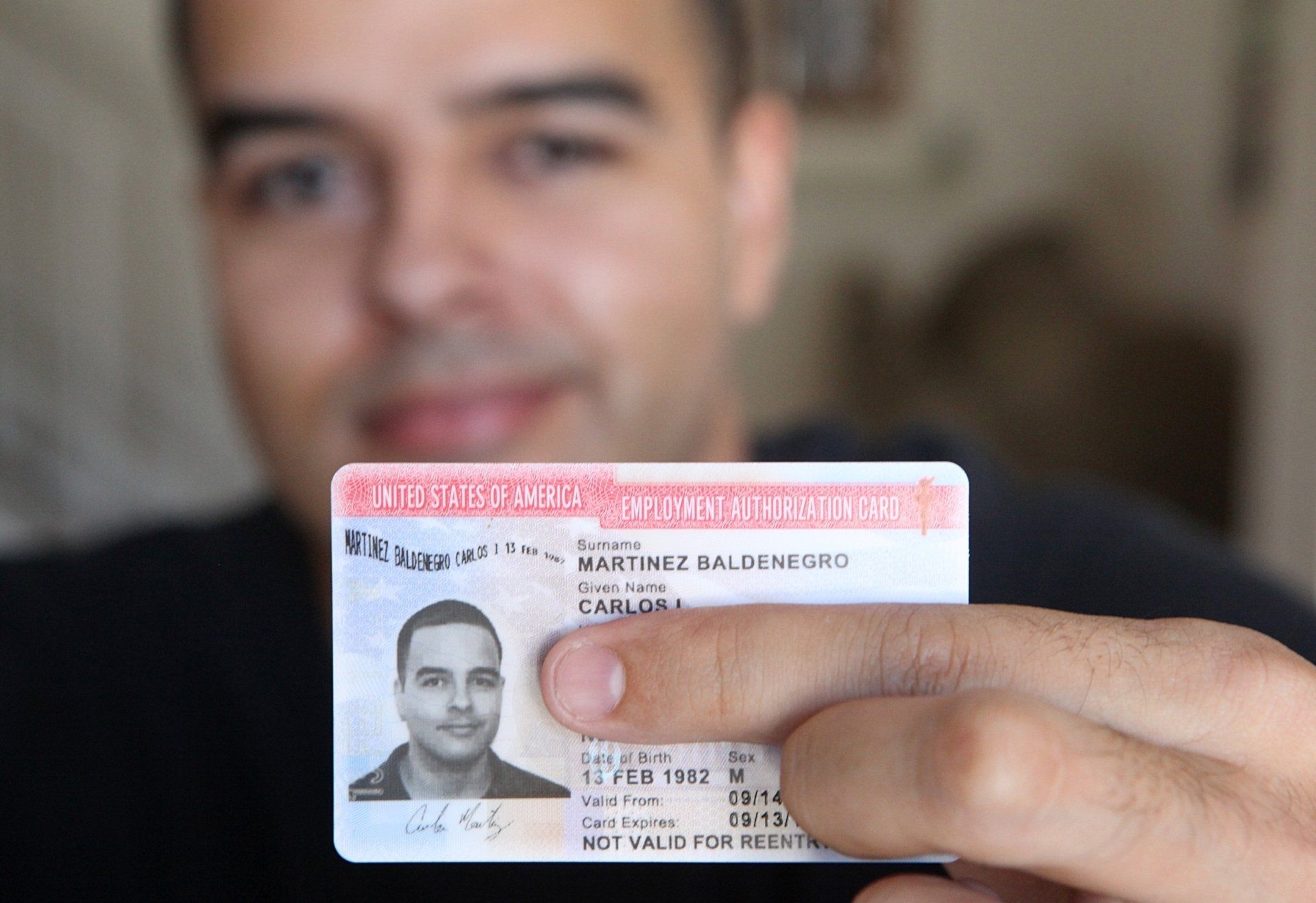Can I Apply for Work Authorization while my Asylum Application is Pending?
Angelica Rice • February 11, 2022

Click here to read this article in Portuguese
Each year, many people come to the United States seeking refuge from harm or persecution that they suffered in their home country. Those people apply for Asylum (Form I-589) either before USCIS or in removal proceedings before the Immigration Court.
A common question amongst all Asylum Applicants, no matter where they are applying, is can I obtain authorization to work while my Asylum application is pending?
As a result of a change in the law on August 25, 2020, for many Asylum Applicants, the answer to that question is NO.
However, there are some exceptions and circumstances where an Asylum Applicant may be eligible for and be granted work authorization while their Asylum case is pending. Read on to find out more.
You cannot apply for permission to work (employment authorization) in the United States at the same time you apply for asylum. You may apply for employment authorization 365 calendar days after you file your complete asylum application.
Due to a recent change in the Immigration Court’s case adjudication policies, Court’s are prioritizing the expeditious adjudication of immigration cases, especially for Respondent’s who entered the United States unlawfully on or after November 1, 2020. Many of those cases are being adjudicated within 1 year of the NTA being filed. This means that for most Asylum Applicants in Court, their cases will not be pending for 365 days and so they will not become eligible for work authorization.
If there is a delay in the adjudication of the Court case, that was not caused by you, or if an Applicant is applying for Asylum before USCIS, then you may be eligible to receive employment authorization based on a pending asylum application if:
- You entered the United States lawfully on or after Aug. 25, 2020 (under limited exceptions, you may still be eligible if you entered the United States unlawfully on or after Aug. 25, 2020);
- For asylum applications filed on or after Aug. 25, 2020, you filed your asylum application within one year from the date of your last arrival into the United States (alternatively, an asylum officer or immigration judge determined that you qualify for an exception to the one-year filing deadline, or you are an unaccompanied alien child on the date the asylum application was first filed);
- You appeared for any scheduled biometric services appointments related to your application for asylum or employment authorization;
- You appeared for your interview with a USCIS asylum officer, or your hearing before an immigration judge, if requested or scheduled;
- You are not described in 8 CFR 208.7(a)(1)(iii);
- You do not have an outstanding applicant-caused delay related to your asylum application when you file your initial application for employment authorization; and
- No final decision has been made on your asylum application (note that a referral to an immigration judge after an interview with USCIS is not a final decision).
If, on the date that your initial application for an employment authorization document (EAD) is filed, there is an unresolved delay in your asylum adjudication that you caused, your EAD request may be denied. Examples of these applicant-caused delays include, but are not limited to:
- Requesting to amend or supplement an asylum application and causing a delay in its adjudication or in proceedings;
- Failure to appear to receive and acknowledge receipt of the decision;
- Requesting to provide additional evidence for an interview, or requesting an extension to submit additional evidence less than 14 days before the interview date, and causing a delay in the asylum application adjudication;
- Failure to appear for an asylum interview, unless USCIS excuses you;
- Failure to appear for scheduled biometrics collection for the asylum application, unless USCIS excuses you;
- Requesting to reschedule an interview for a later date;
- Requesting to transfer a case to a new asylum office or interview location, including when the transfer is for a new address;
- Failure to use a USCIS contract interpreter or provide a competent interpreter at an interview; or
- Failure to comply with any other request needed to determine asylum eligibility.
*Certain criminal offenses or convictions will make you ineligible for an EAD.
If you have questions about work authorization eligibility through a pending Asylum application, please contact one of our experienced immigration attorneys.
This blog is not intended to be legal advice and nothing here should be construed as establishing an attorney client relationship. Please schedule a consultation with an immigration attorney before acting on any information read here.

On March 31, 2024, U.S. Citizenship and Immigration Services (USCIS) implemented a policy update that limits gender marker selections on all immigration forms and systems to two biological sexes: male and female. This change eliminates the option for applicants to select a non-binary or “X” gender marker—an option that had previously been permitted on some forms. While USCIS emphasizes that this update does not change who qualifies for immigration benefits, it may significantly impact how certain applications—particularly asylum claims based on gender identity-related persecution—are understood and evaluated. What Has Changed? Under the revised policy, applicants may now only choose “Male” or “Female” when completing USCIS forms. The ability to select a non-binary or third-gender option is no longer available. Applicants may still request to change their gender marker with USCIS, but only within the male/female binary. Supporting documentation, such as medical or legal records, is not required to make the change. This means that transgender individuals can still align their gender marker with their identity—if it falls within the two binary categories—but non-binary individuals are no longer represented. The change follows guidance issued by the federal Office of Management and Budget (OMB), which called for greater consistency in the collection of sex and gender data across federal agencies. Impact on Asylum Applicants This policy update is especially important for individuals applying for asylum based on persecution related to their gender identity. Under U.S. immigration law, asylum is available to people who have suffered persecution—or fear future persecution—based on their membership in a “particular social group.” This includes people targeted for being transgender, gender non-conforming, or otherwise not aligning with socially expected gender roles in their home country. Although the legal standard for asylum remains unchanged, the removal of the non-binary gender marker could make it harder for some applicants to clearly present and document their identity. In asylum cases, credibility and clarity are crucial. The ability to accurately reflect one’s gender identity on official forms can play an important role in establishing the foundation of a persecution claim. Now, applicants who identify as non-binary or outside the traditional male/female categories may be forced to select a gender that does not align with their lived experience. This could lead to confusion in their case file or require additional explanation during interviews or hearings. This policy could weaken the strength of some asylum claims—not because the underlying facts have changed, but because the official forms now fail to reflect the applicant’s true identity. For example: A non-binary person applying for asylum after being targeted in their home country may now have to select “Male” or “Female” on their asylum application, despite not identifying as either. This mismatch may lead adjudicators to question the applicant’s identity, possibly weakening the strength of the claim or requiring added clarification and documentation. In defensive asylum cases—where applicants are in removal proceedings—such inconsistencies could create unnecessary hurdles and complicate the evidentiary presentation. What Can Applicants Do? Despite the change, individuals can still pursue asylum based on gender identity. The underlying eligibility criteria remain the same. However, applicants should be prepared to clearly explain any differences between their stated identity and the gender marker required on USCIS forms. Applicants are encouraged to: Include a personal declaration explaining their gender identity in detail and how it relates to their fear of persecution. Provide evidence such as affidavits, country condition reports, or expert testimony that supports the claim. Work with an experienced immigration attorney who can help present the claim effectively and prepare for any questions that might arise from the new form limitations. The new USCIS policy on gender markers may seem like a technical update, but for asylum seekers fleeing gender-based persecution, it has real implications. While individuals are still legally eligible to seek protection, the limitation to binary gender options could make it more difficult to fully and clearly present their case. If you or someone you know is facing immigration challenges related to gender identity—or is concerned about how this policy may impact an asylum claim—please contact Santos Lloyd Law Firm to schedule a consultation with one of our experienced immigration attorneys. We’re here to help ensure your voice is heard and your case is handled with the care and expertise it deserves.

In 2025, the immigration landscape continues to shift under the weight of national security concerns, ushered in by Executive Order “ Protecting the United States From Foreign Terrorists and Other National Security and Public Safety Threats. ” This directive tasks federal agencies—including the U.S. Department of State—with implementing enhanced screening and vetting protocols for all foreign nationals seeking visas or other immigration benefits. The result? A dramatically intensified vetting process, along with mounting concerns from immigrants, attorneys, and civil liberties advocates alike. Traditionally, airport security focused on verifying travel documents and screening for prohibited items, while consular officers assessed the legitimacy of visa petitions and the admissibility of applicants. Extreme vetting, however, represents a significant shift toward a far more invasive and comprehensive investigative process. It now includes detailed background checks, biometric verification, digital forensics, and expansive scrutiny of an applicant’s online presence and criminal or financial records. Since President Trump’s second term began in January 2025, the implementation of extreme vetting has expanded rapidly. Today, border screenings go far beyond routine document checks, encompassing a full-scale evaluation of a traveler’s digital life. This pivot reflects the administration’s intensified focus on national security, but it has also triggered urgent discussions about privacy, due process, and the fairness of modern immigration enforcement. At U.S. ports of entry—especially airports—noncitizens are now subject to rigorous and invasive procedures, including: Inspection of cell phones, laptops, and other devices (including deleted content) Review of social media activity on platforms like TikTok, Instagram, and X (formerly Twitter) Biometric scanning, including fingerprinting and facial recognition These measures are no longer confined to travelers from high-risk countries. In practice, extreme vetting applies broadly across all nationalities, and increasingly affects lawful permanent residents as well. For noncitizens, this new landscape introduces a heightened level of uncertainty and vulnerability. Delays at U.S. consulates for visa issuance or renewal are becoming routine. Travelers must now be acutely aware of these changes, and those attending consular interviews or seeking visa renewals should be prepared to provide additional documentation verifying their maintenance of status, compliance with visa conditions, and the bona fide nature of their visa applications. It is critical to organize supporting materials in advance and be ready to answer questions about employment, education, travel history, and online activity. As the U.S. government continues to expand its use of data-driven risk assessment tools, travelers must adapt to a new normal, one where preparation is essential to navigating the immigration system without disruption.

For international business owners and entrepreneurs engaged in cross-border trade with the United States , the opportunity to expand operations and establish a physical presence in the U.S. may be more accessible than expected. The E-1 Treaty Trader Visa is specifically designed to facilitate this type of business activity and offers a strategic pathway for qualifying individuals to live and work in the United States while managing or developing trade relationships. While 2025 has brought a trend of changes in immigration policy, the E-1 visa continues to stand out as a viable and welcoming option . Despite increased scrutiny across various immigration categories, this visa remains suitable for those involved in consistent, qualifying trade with the U.S. Its structure and purpose align well with current business realities, making it a stable choice even amid policy shifts. The E-1 visa is available to nationals of countries that maintain a treaty of commerce and navigation with the United States . To qualify, applicants must demonstrate that they are engaged in substantial trade—defined as a continuous flow of sizable international transactions—primarily between their home country and the U.S. Unlike investment-based visas, the E-1 visa does not require a fixed monetary threshold. Instead, it emphasizes active commercial exchange, such as the regular transfer of goods, services, or technology. This visa is applicable across a wide range of industries , including but not limited to manufacturing, logistics, professional services, consulting, finance, tourism, and technology. If more than 50% of your international trade is with the United States, and the business activity is consistent and well-documented, the E-1 visa may be a strong fit for your current business model. In addition to its flexibility, the E-1 visa is renewable as long as the trade activity continues. It also extends benefits to eligible family members: spouses and unmarried children under 21 may accompany the principal visa holder, and spouses are eligible to apply for U.S. work authorization, offering added support and financial opportunity for the family. This visa category is particularly well-suited for business professionals who are already operating in international markets and looking to formalize or expand their presence in the U.S. It rewards active engagement, proven commercial performance, and long-term trade partnerships. If you are currently engaged in trade with the United States and are considering expanding your business operations, the E-1 Treaty Trader Visa may provide a clear and effective route forward. Our attorneys at Santos Lloyd Law Firm are here to help you assess your qualifications and guide you through each stage of the process with clarity, strategy, and confidence.


